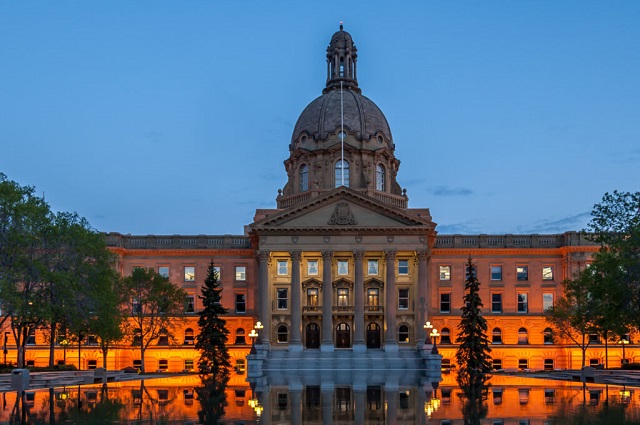Alberta
Protecting the right to vote for Canadian citizens: Minister McIver

Minister of Municipal Affairs Ric McIver issued the following statement in response to Calgary City Council’s vote to extend the right to vote to permanent residents:
“Yesterday, Calgary city council passed a motion advocating for permanent residents to be extended the right to vote in civic elections. Alberta’s government has been clear since the beginning: only Canadian citizens are able to vote in civic elections. That will not be changing.
“The Canadian Charter of Rights and Freedoms affirms the right of every Canadian citizen to vote and to run as a candidate. This right extends to voters in municipal, provincial and federal elections.
“Protecting our democracy is of the utmost importance. Our provincial election legislation, like the Local Authorities Elections Act, has also been clear since its inception that voting is a right of Canadian citizens.
“Alberta’s government is also ensuring that voting is accessible for more Albertans. The Municipal Affairs Statutes Amendment Act proposes to enable special ballot access for any voter who requests it, without having to provide any specific reason such as physical disability, absence from the municipality or working for the municipal election. The ministries of Seniors, Community and Social Services and Service Alberta and Red Tape Reduction are also making it easier for individuals to obtain the identification Albertans need for a variety of services, including the ability to cast a ballot.
“Our government will continue to protect the integrity of our elections and make sure voting is accessible for all Albertans who are Canadian citizens.”
Alberta
Temporary Alberta grid limit unlikely to dampen data centre investment, analyst says
From the Canadian Energy Centre
By Cody Ciona
‘Alberta has never seen this level and volume of load connection requests’
Billions of investment in new data centres is still expected in Alberta despite the province’s electric system operator placing a temporary limit on new large-load grid connections, said Carson Kearl, lead data centre analyst for Enverus Intelligence Research.
Kearl cited NVIDIA CEO Jensen Huang’s estimate from earlier this year that building a one-gigawatt data centre costs between US$60 billion and US$80 billion.
That implies the Alberta Electric System Operator (AESO)’s 1.2 gigawatt temporary limit would still allow for up to C$130 billion of investment.
“It’s got the potential to be extremely impactful to the Alberta power sector and economy,” Kearl said.
Importantly, data centre operators can potentially get around the temporary limit by ‘bringing their own power’ rather than drawing electricity from the existing grid.
In Alberta’s deregulated electricity market – the only one in Canada – large energy consumers like data centres can build the power supply they need by entering project agreements directly with electricity producers.
According to the AESO, there are 30 proposed data centre projects across the province.
The total requested power load for these projects is more than 16 gigawatts, roughly four gigawatts more than Alberta’s demand record in January 2024 during a severe cold snap.
For comparison, Edmonton’s load is around 1.4 gigawatts, the AESO said.
“Alberta has never seen this level and volume of load connection requests,” CEO Aaron Engen said in a statement.
“Because connecting all large loads seeking access would impair grid reliability, we established a limit that preserves system integrity while enabling timely data centre development in Alberta.”
As data centre projects come to the province, so do jobs and other economic benefits.
“You have all of the construction staff associated; electricians, engineers, plumbers, and HVAC people for all the cooling tech that are continuously working on a multi-year time horizon. In the construction phase there’s a lot of spend, and that is just generally good for the ecosystem,” said Kearl.
Investment in local power infrastructure also has long-term job implications for maintenance and upgrades, he said.
“Alberta is a really exciting place when it comes to building data centers,” said Beacon AI CEO Josh Schertzer on a recent ARC Energy Ideas podcast.
“It has really great access to natural gas, it does have some excess grid capacity that can be used in the short term, it’s got a great workforce, and it’s very business-friendly.”
The unaltered reproduction of this content is free of charge with attribution to the Canadian Energy Centre.
Alberta
Alberta Next: Taxation

A new video from the Alberta Next panel looks at whether Alberta should stop relying on Ottawa to collect our provincial income taxes. Quebec already does it, and Alberta already collects corporate taxes directly. Doing the same for personal income taxes could mean better tax policy, thousands of new jobs, and less federal interference. But it would take time, cost money, and require building new systems from the ground up.
-

 illegal immigration2 days ago
illegal immigration2 days agoICE raids California pot farm, uncovers illegal aliens and child labor
-

 Uncategorized14 hours ago
Uncategorized14 hours agoCNN’s Shock Climate Polling Data Reinforces Trump’s Energy Agenda
-

 Business1 day ago
Business1 day agoTrump to impose 30% tariff on EU, Mexico
-

 Energy1 day ago
Energy1 day agoLNG Export Marks Beginning Of Canadian Energy Independence
-

 Business1 day ago
Business1 day agoCarney government should apply lessons from 1990s in spending review
-

 Entertainment1 day ago
Entertainment1 day agoStudy finds 99% of late-night TV guests in 2025 have been liberal
-

 Frontier Centre for Public Policy14 hours ago
Frontier Centre for Public Policy14 hours agoCanada’s New Border Bill Spies On You, Not The Bad Guys
-

 Opinion6 hours ago
Opinion6 hours agoPreston Manning: Three Wise Men from the East, Again






